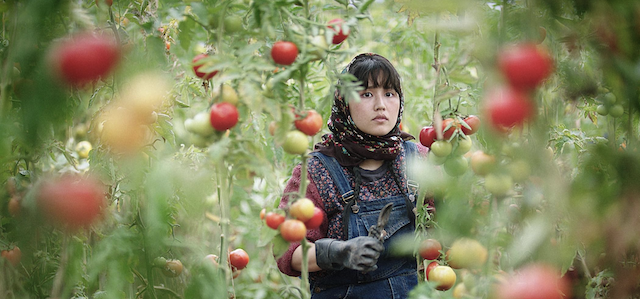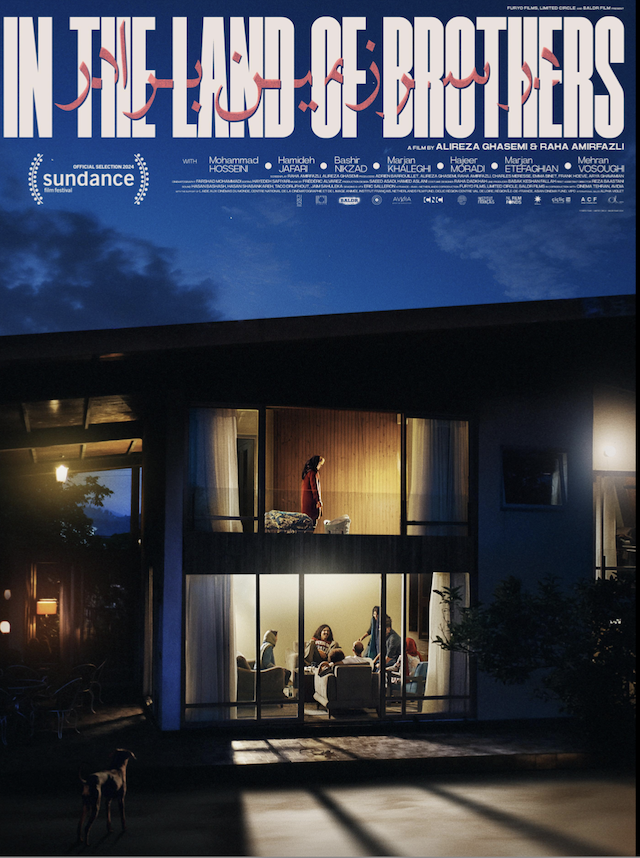
The most striking political stories are often those that infuse their its characters with a sense of heartfelt authenticity. Up-and-coming filmmakers Raha Amirfazli and Alireza Ghasemi did just that with their new drama, In the Land of Brothers.
To create the sense of universality, the filmmaking duo looked to the real-life Afghan community in Iran. That dedication to authenticity and community is a driving force behind the project’s story, which the filmmakers consider to be both deeply personal and universal.
Amirfazli and Ghasemi made their feature film writing, directorial and producing debuts on In the Land of Brothers. The duo reunited after they penned, helmed and produced the 2021 short, Solar Eclipse. Their new feature stars cast made up of a majority of nonactors, including Hamideh Jafari, Bashir Nikzad and Mohammad Hosseini.
In the Land of Brothers follows three members of an extended Afghan family – Mohammad (Mohammad Hosseini), Leila (Hamideh Jafari) and Bashir Nikzad as Qasem – as they start their lives over in Iran as refugees. However, they’re unaware they face a decades-long struggle ahead to be at home.
Nearly five million Afghan refugees live in Iran, often with such tenuous legal status that any unexpected event could lead to such tragic events as forced deportation or family separation. Starting in 2001, these three stories capture the plight of people living their lives with hope and joy. However, they’re trapped under a state that constantly threatens police brutality, administrative violence and armed conflict.
Amirfazli and Ghasemi generously took the time recently to talk about scribing, helming and producing In the Land of Brothers during an exclusive interview over Zoom. The filmmakers spoke about making the project to help promote its World Premiere in the World Cinema Dramatic Competition at the Sundance Film Festival.
The movie will premiere at Sundance on January 22 at 3:15pm MST at the Prospector Square Theatre in Park City, Utah. The drama will also be available online from January 25-28.
Q: Together, you co-wrote the script for the new drama, In the Land of Brothers. What was the inspiration in penning the screenplay for the film?
Alireza Ghasemi: Our collaboration together is a long story, as we have been working together for a long time. On our previous films together, we worked as casting directors, actors, set designers and costume designers.
Then we made a short film called Solar Eclipse together as writer-directors. Then wed decide to make this film together.
I think as we developed this story, we started with chapter two; we worked on Laila’s story first. Then we developed the story by telling the stories of other parts of this family through this 30-year journey.
Q: How did you approach researching the experience of Afghan refugees moving to Iran following the U.S. invasion of Afghanistan for the movie?
Raha Amirfazli: We listened to a lot of podcasts about Afghan refugees in Iran. We also read a few books on the matter.
I would say that what helped us the most was the casting process because it was a very lengthy process; we took six-seven months to cast.
During that time, we met with a lot of the artist community in Iran that are Hazaras. We listened to their life stories, many of which are similar to the stories that we have.
We actually got some advice from our casting director who is also a Hazaras. The casting director actually helped us connect with many wonderful artists from the community.
During that process of casting people, we heard the stories and started rewriting. We showed the stories to other people who we were thinking of to play the characters. We got their feedback until we cast our main actors. Their lives very much resembled the stories that we wanted to tell.
Through talking with them, we did more research. We then finalized the script.

Q: Speaking about the casting process, In the Land of Brothers stars Mohammad Hosseini as Mohammad; Hamideh Jafari as Leila; and Bashir Nikzad as Qasem. How did you decide who you wanted to star in the film?
Alireza Ghasemi: One of the most fun and interesting parts of making films is getting to know actors. The casting started from our casting director, who as Raha said, is a Afghan refugee himself.
Then we got introduced to a small theater where refugees gather each week to read books and try to work as playwrights. They even watch films together.
Then we started small auditions. In those small auditions, those people suggested to us their brothers, sisters, nephews and other members of their families to come in for an audition. So we read the stories together, talked about their backgrounds and our backgrounds, and what they felt by reading the story in the script.
Then we collected their ideas, and then after that we had our choices. Then we started a very long rehearsal period with the people we cast.
Q: Together, you also made your feature film directorial debuts on the project. How did scribing the script influence your helming style throughout the production?
Raha Amirfazli: It worked pretty well between the two of us because we had a very lengthy pre-production period. That helped us work through all of the disagreements. It brought us to a very similar mindset about how the film was going to look. During and after that process, we had a lot of discussions with our key crew members.
The responsibilities varied and between each chapter, and even in one chapter between different scenes. For example, in one scene we felt that the actor connected more emotionally to Alireza. So he was the one who directed the actors, and I would be responsible to talk to the cinematographer, costume designer and everyone else. It changed during the span of each scene and chapter.
Q: Speaking about working with In the Land of Brothers‘ cinematographer, Farshad Mohammadi, how did you work together to create the visual look of the feature?
Alireza Ghasemi: Our DP, Farshad Mohammadi, is one of the most prestigious cinematographers in the Iranian film industry. It was our first experience with him.
But I think Raha and I weren’t confident enough. We were skeptical about whether this guy was going to accept our proposal to be our DP on this film. (Ghasemi laughs.) So Raha and I started to watch all of his previous films.
We then invited him to a meeting. I think we kind of impressed him with the story, and also having the knowledge of, and commenting on, all of his former works. We talked about how he works with light and the camera. So at the end, he accepted.
It was very, very interesting because we watched all of these different films. We also made a visual CV, for which we gathered many pictures from lot of photographers and many different films. We watched them together and talked about the framing, the colors, the composition and camera angles. It was like a workshop, to be honest. Then on the set, he came up with many interesting ideas.
Q: The drama’s music was composed by Frédéric Alvare. What was your experience in working with Frédéric to create the movie’s score to emphasize the story’s emotions and tension?
Alireza Ghasemi: Frederick started to work with us in the beginning of us writing the script. We sent him the script and he read it. Then he started to compose some music for us.
It was very interesting. When you want to describe your feeling about the characters and the story to the composer, you need to talk a little bit differently.
I remember that we talked about colors when we wanted to describe our feelings towards the characters. Some characters were red and the other ones were yellow. Then he gathered a lot of different music from the films that they liked. I think through this process, we had a better understanding about the story that we wanted to tell visually.
Raha Amirfazli: It was very interesting to work with the composer from the very early stages of development. I think the early versions of his composition helped us on set.
We came up with themes for each actor. We would play them for the actors on set to bring them into the mindset of that music. I think that reflected very well through the acting.
Q: Besides writing and directing In the Land of Brothers, you both also served as producers on the project. Why did you decide also produce the film?
Alireza Ghasemi: In our film school, we mainly focused on directing. Unlike the areas of directing script writing, cinematography and editing, our school program wasn’t filled with producing or production management. So producing was quite new for both of us.
I think it’s courageous to make some mistakes and learn from those mistakes. I think we did make some mistakes. But we were persistent to finish the film, even though it was a long journey.
We also had the privilege to have other producers; we had a Dutch producer and a French producer who helped us a lot. Also, our line producer and our first assistant director really helped us to make this film happen in production.
Raha Amirfazli: Yes. Everywhere in the world, if you are going to make independent films, you need to have a hand in producing. But that’s especially true in Iran, and especially with this film.
We couldn’t get any official support from the good producers that exist in Iran because of the story’s political content. So we had to produce the film ourselves. It’s a good thing that we enjoy producing our own films.
We had some experience producing our short films. But I think it really helps to have a very close-knit family on sets. There’s no escape from producing if you want to succeed as an independent filmmaker.
Q: In the Land of Brothers is having its World Premiere at Sundance. What does it mean to you that the drama is premiering at the festival?
Alireza Ghasemi: It is one of the best pieces of news we received in the last year, but I was still semi-shocked when I heard the news. Sundance is the best place you can show your independent film. but I am looking forward to it, and to meeting people in person there.
In their feature debut, Amirfazli and Ghasemi dazzle as a new voice in Iranian cinema. But the lasting power of In the Land of Brothers lies in the enduring performances of its actors. Their humanity lends a unique perspective into the struggle of living as a refugee in Iran, but will be recognizable around the world.

